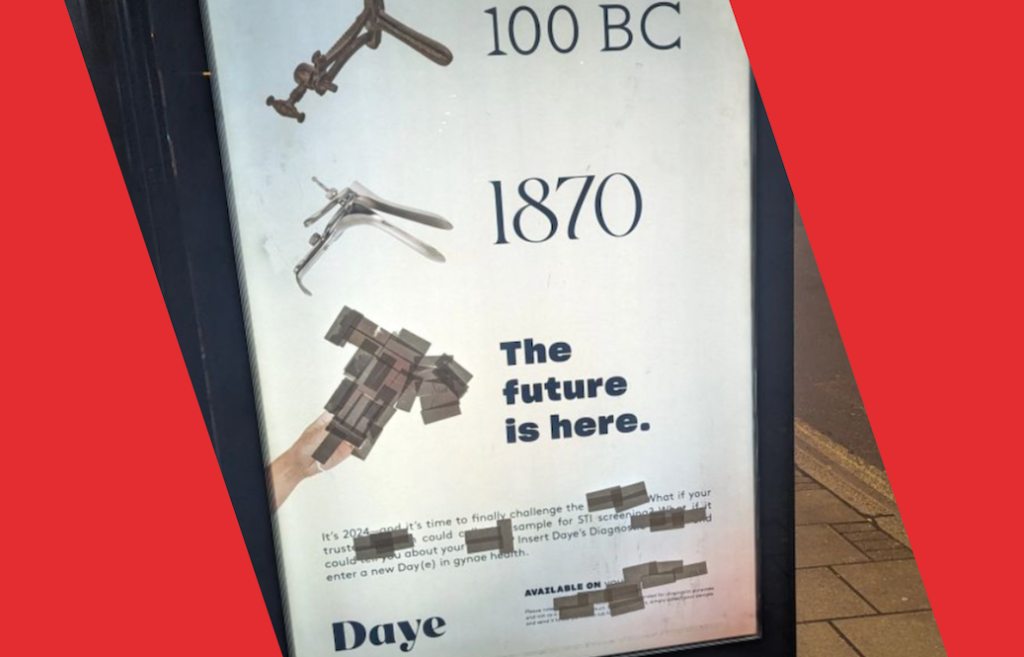
In her book, “Invisible Women,” Carolina Criado Perez eloquently points out the pervasive gender biases that shape our public spaces: “When planners fail to account for gender, public spaces become male spaces by default.” This observation lays the groundwork for a broader discussion about the systematic marginalization and censorship faced by women and subsequently women’s health initiatives in both physical and digital spaces. And today, this insight is unfortunately more relevant than ever.
A recent incident involving Daye, a gynecological health startup, and the censorship of their advertisements in London serves as a disappointing illustration of these biases in action. As you can see in the cover image, tape was placed all over ads discussing gynecological health in what appeared to be an almost reflexive act of censorship. The silver lining? The gynecological health community, led by champions like Hani Lees Dresner from Gashtrays and Florence Schechter from the Vagina Museum, rallied to uncensor the ads.
Their initiative demonstrates tangible, and much needed action against such biases, and it also shines a light on the broader censorship issue all so familiar to the femtech community not just in physical, but also in digital advertising spaces. Despite policy revisions by platforms like Meta, which now explicitly permit ads promoting sexual health, wellness, and reproductive health products, the struggle for equal representation and destigmatization persists. These policy changes were prompted by the Center for Intimacy Justice’s investigative report, which exposed the systemic rejection of women’s health advertisements and the underlying bias that often conflates women’s health with inappropriateness.
Meta’s policy update marks progress, but it also highlights the ongoing need for vigilant enforcement and the dismantling of algorithmic biases that continue to marginalize content related to women’s health under the guise of ‘brand safety’. Our own experiences at Femtech Insider reflect this struggle. As a platform dedicated to covering the women’s health innovation ecosystem, we’ve encountered challenges with advertising networks that label our content as “unsafe,” underscoring the issue of over-censorship that stifles essential conversations.
And no, the censorship of women’s health topics isn’t just a “corporate issue”. It represents a societal issue that perpetuates outdated stigmas and hinders much needed educational and supportive discussions. By viewing conversations on menstruation, reproductive health, sexual wellbeing, and more as taboo, we fuel a cycle of ignorance and silence that benefits absolutely no one.
So today, as we celebrate those who stepped up to uncensor the Daye ads, our thoughts also turn to the rampant censorship still prevalent within digital spaces. The actions of Hani Lees Dresner, Florence Schechter, and the broader gynecological health community exemplify the power of collective action against the status quo. And as the founder of this very platform all I’ll say is: The fight continues. Count us in.
Our shared mission is to nurture a society that not only embraces but actively fosters open dialogues about all aspects of health. And yes. This obviously includes women’s, reproductive, and sexual health. We advocate for environments—both physical and digital—that reflect and cater to diverse needs and experiences, free from the constraints of outdated prejudices and censorship practices. Last week Hani Lees Dresner and Florence Schechter found a way to physically “fix” the Daye ads across London. We all are now challenged to figure out how we can contribute to “fixing the algorithms” that perpetuate these issues online.
Will it be easy? No. Will it be quick? No. But I genuinely believe that together, we can and must strive towards a future where the stigma we face today becomes a relic of the past. Because in the end our very own health and the health of our communities depend on it.



